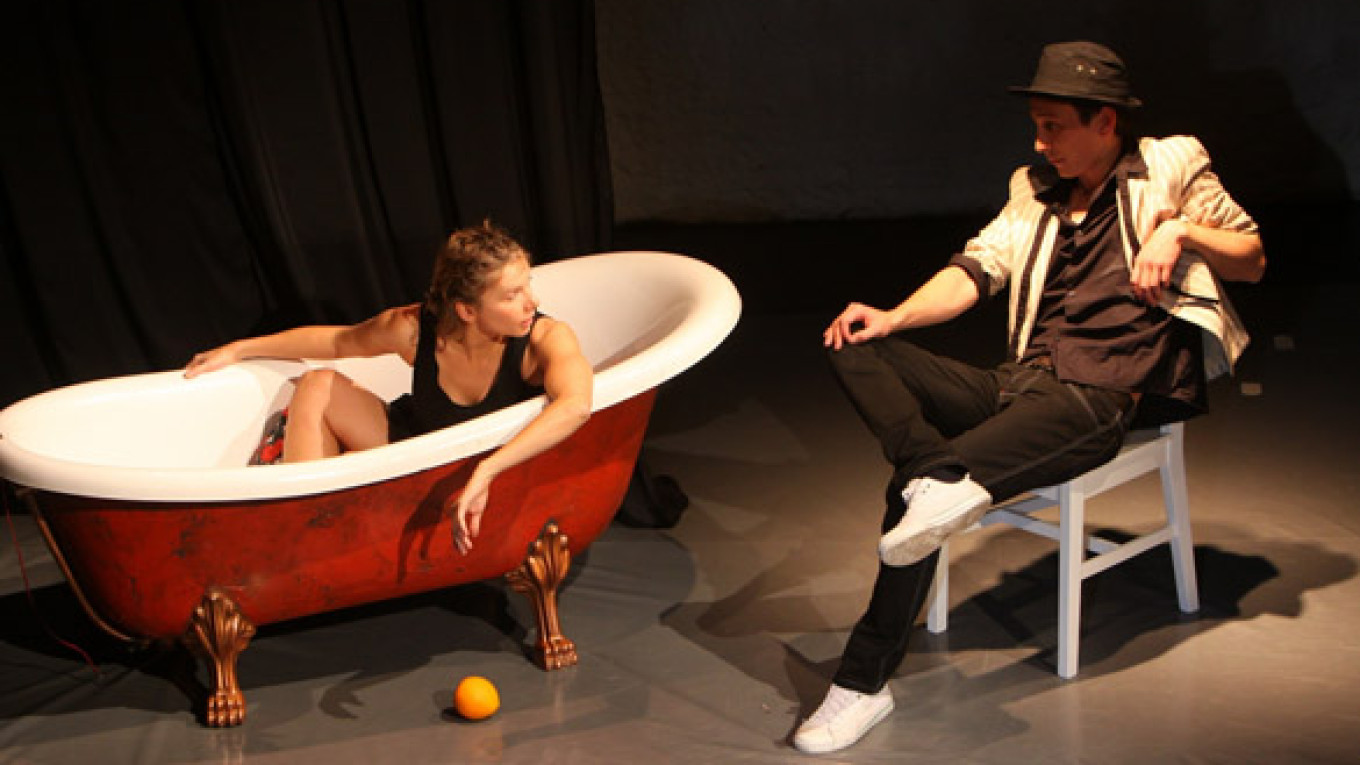It is a sign of the times that so many major Russian playwrights find themselves respected and in demand throughout the world, and yet barely able to get a foot in the door in theaters at home.
Olga Mukhina is routinely and justifiably identified as the originator of the current wave of new Russian drama. And yet, when over the weekend the Drugoi Theater opened a rendition of Mukhina’s “The Love of Karlovna,” it was the first Mukhina play to be staged professionally in Moscow since 2005. The last before that was in 2001. During the same period, dozens of productions were mounted in Estonia, Slovakia, the Czech Republic, Slovenia, Bulgaria, France, the United States and elsewhere.
Mukhina is an enigma and a challenge. She is not prolific. Since 1996 she has completed just four plays that defy categorization, just as her characters often defy description. Famously, theater directors have told her she writes film scripts, not plays, while film directors have declared that her screenplays are constructed like theatrical texts. Her dialogues can read like scraps of conversations cut up, jumbled in a bag and tossed out at random on a tabletop. Her characters often think aloud, saying strange things no one would ordinarily say publicly. Meanwhile, what they do say openly might strike some as unthinkable.
All of this adds up to one of the richest, most unique and poetic voices in Russian literature today.
“The Love of Karlovna,” staged by the Drugoi Theater under the title of “Love Story,” is arguably Mukhina’s most opaque work. The oldest of her four plays, it was written when she was 21. Chaotic, emotional and thickly atmospheric, it focuses on Holly, a smart, witty and strong young woman who is unable to forget a passionate love affair with a man who left her to go to Paris. She is surrounded by a crowd of hip eccentrics who do their best to pull her out of her tailspin.
Sometimes, however, one’s best is not enough.
It is a trademark of Mukhina that Holly is anything but a hapless victim. A modern female version of “The Sorrows of Young Werther” this decidedly is not. Or, if it is, it is turned completely on its head.
As performed by Irina Rakhmanova, Holly looks as healthy and happy as anyone around her. Only at certain moments — often played just seconds before blackouts in this fast-paced, but somewhat amorphous, production by Oksana Tsekhovich — does she reveal her festering psychological wounds.
Her friend Gornotsvetov (Anton Fyodorov) is a sometime lover, but mostly he is a fun, quirky, interesting guy who keeps her in balance. More on the wild side is Begonia (Darya Airapetova), an extravagant individual with a voracious appetite for life, a connoisseur of everything having to do with style and image. All of them are ready to party, and booze and sex are plentiful.
“Love Story” contains one of Mukhina’s most inscrutable characters — an unnamed man who repeatedly shrinks to a tiny size and melts into a puddle before walking back in the door as though nothing has happened. Tsekhovich, with actor Alexander Gorelov, found a rudimentary and humorous way to perform this magic act, inciting some of the biggest laughter of the night.
Co-designers Tsekovich and Yevgenia Panfilova, along with film editor Igor Maslov, made effective use of film and animation projections. The images stretching across the back wall give expression to the notion that most everything transpiring on stage is triggered by Holly’s deepest inner thoughts. We see a woman’s gloved hand scribbling texts; we see another hand painting rich, brightly colored images. None of this illustrates the story directly; all of it suggests the beauty and poetry of Holly’s world, a fragile, innocent world that is on the verge of crashing.
Tsekovich wisely excised large portions of this big play and pared down the number of characters. At its best, her production reflects the emotional turmoil and mysterious poetry of the original.
Where it can stumble is in its pacing and clarity. Actors often shout to be heard over loud music, turning the text and music into a formless racket. The sparse set decoration — primarily a free-standing bathtub and an overturned casket — gives the action little grounding in place.
“Love Story,” however, struck me as a cup half-full, not half-empty. Whatever its shortcomings, Tsekhovich’s production is ambitious and imaginative. And it is great to have Mukhina back on a Moscow stage.
“Love Story” (Lavstoria), a production of the Drugoi Theater, plays Sat. and Oct. 25 at 7 p.m. at the Vysotsky Center, located at 3 Nizhny Tagansky Tupik. Metro Taganskaya. Tel. +7 (499) 973-2141, Dteatr.ru. Running time: 1 hour, 30 minutes.
A Message from The Moscow Times:
Dear readers,
We are facing unprecedented challenges. Russia's Prosecutor General's Office has designated The Moscow Times as an "undesirable" organization, criminalizing our work and putting our staff at risk of prosecution. This follows our earlier unjust labeling as a "foreign agent."
These actions are direct attempts to silence independent journalism in Russia. The authorities claim our work "discredits the decisions of the Russian leadership." We see things differently: we strive to provide accurate, unbiased reporting on Russia.
We, the journalists of The Moscow Times, refuse to be silenced. But to continue our work, we need your help.
Your support, no matter how small, makes a world of difference. If you can, please support us monthly starting from just $2. It's quick to set up, and every contribution makes a significant impact.
By supporting The Moscow Times, you're defending open, independent journalism in the face of repression. Thank you for standing with us.
Remind me later.


